 The Particulars of the Picture
The Particulars of the Picture
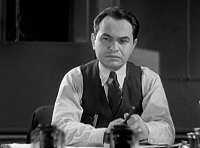 |
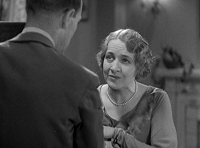 |
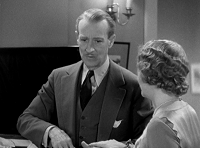 |
| Randall … Edward G. Robinson |
Frances Starr … Nancy Townsend |
Michael Townsend … H.B. Warner |
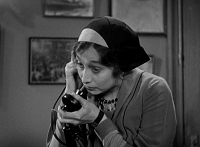 |
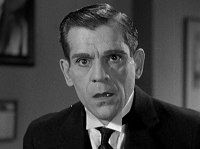 |
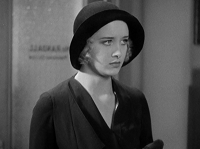 |
| Miss Taylor … Aline MacMahon |
T. Vernon Isopod … Boris Karloff |
Jenny Townsend … Marian Marsh |
Five Star Final: Read All About It
“There’s some guys that furnish the manure, and there’s some guys who grow the flowers.”
It’s time for a dirty little secret from me. It’s an unsurprising secret considering how often I drop the Oxford comma, but here it is anyway: I spent two years in journalism school.
Now the reason it was two and not four comes down to something that Five Star Final directly addresses in its own immodest terms: journalism has two goals: elevating public discourse and making money. The concerns of the latter, unfortunately, often outweigh those of the former.
This wasn’t a surprising notion in 1931 when this picture was made, and anyone who reads this now has probably at least seen the widget that the Associated Press distributes filled with stories about decadent food, YouTube videos of car chases and celebrities in bikinis among others things. All major news sites traffic in human interest stories or controversial issues that do nothing but give the user the satisfying feeling of schadenfreude as fast as they can dish it out.
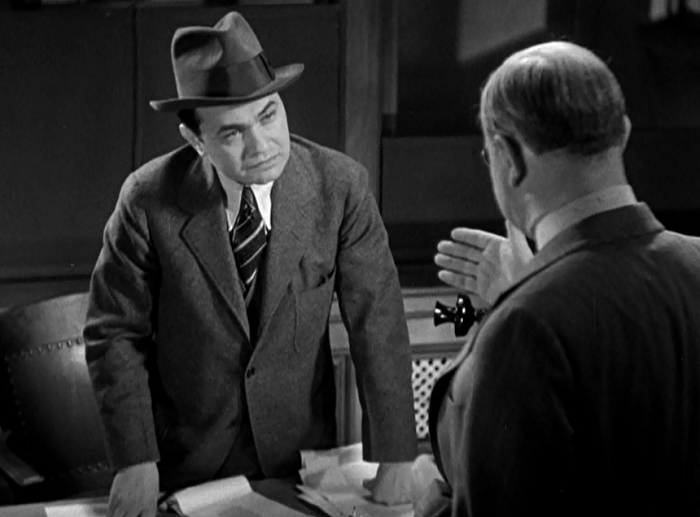
Well, Edward G. Robinson has had enough of it! … Eventually!
The tabloid depicted in 1931’s Five Star Final may lack YouTube, but its craven sense of exploitation would still put it in the running right next to The Sun in overeager attempts of titillation.
Its editor, Randall (Robinson), has been trying to class up the paper’s content, but meets with resistance every step of the way. The owner and his cronies object, and bring up an idea for a hot serial: 20 years earlier, Nancy Voorhees (Frances Starr) murdered a man after he fathered a child with her and refused to marry her. The woman was let free by a sympathetic jury; where is she now?
Randall goes along with it, only because the constant battles over content, including over whether to stick undressed women in the pages or to advertise shady ‘supplements’, have worn him down. His secretary, Miss Taylor, probes him for his complicity, and his simple response is, “I’ve been in this game too long to be ashamed of myself.”
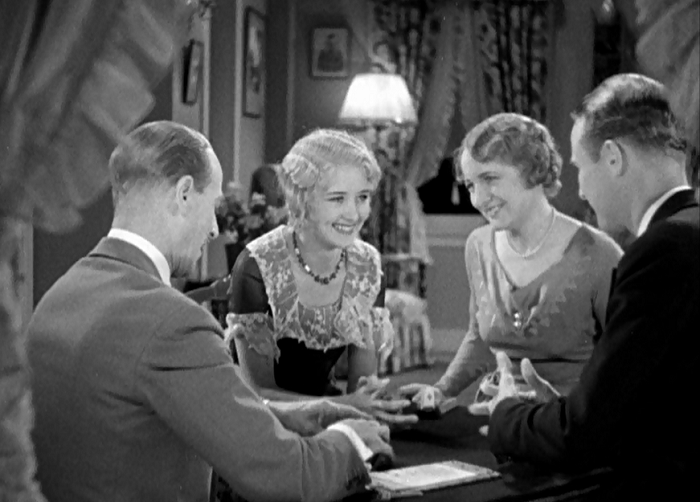
Leering on the unsuspecting family.
Well, we soon discover that Nancy Voorhees is now Nancy Townsend, and she’s married to a wonderful man (H.B. Warner) and raised a wonderful daughter, Jenny (Marian Marsh). Jenny is set to be married to Phillip. Nancy has moved on with her life, and Jenny has no idea that the father who raised her isn’t the one who fathered her. Everyone is happy as can be, which makes the sense of doom hanging over them all the more palpable.
Director Mervyn LeRoy does some clever stuff with Nancy’s half of the story, keeping the character trapped in her apartment through most of her troubles. He also uses the large living room window as a framing device, reinforcing that not only are the papers being voyeuristic spies, but that we the audience are sneaking a peek as well. This changes to a doorway later on, as the harassment that the Gazette provides lead her to desperate actions.
But before that, Nancy and her husband have a conniving reporter show up and steal their story out from under them. He’s Isopod (Karloff, a few weeks off from making Frankenstein), and he’s one of those movie creations that makes you nervous. Isopod was a minister before he decided he liked drinking and women better, and his flirtations with a female reporter don’t go reciprocated as well as ‘nearly rubbing the skin’ off her knee.
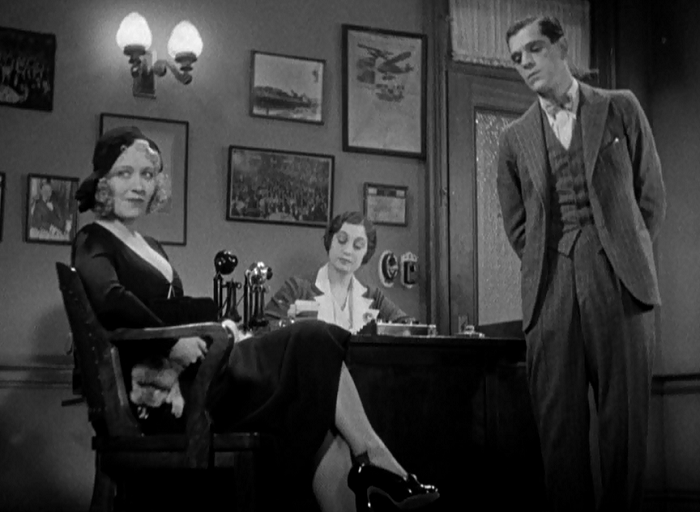
Karloff, creepy even without makeup.
Karloff leers, but shows a measure of vulnerability as well. While he’s happy to exploit this couple under false pretenses (pretending he will be conducting the wedding ceremony for Jenny), but he’s a drunkard as well. If he has a guilty conscience, he at least tries to drown it. That goes for everyone at the Gazette, with Randall musing that, “God gives us heartache, and the devil gives us whiskey.”
As Nancy Voorhee’s life collapses in, they ignore her pleas as the papers continue to fly off the shelves. One notable scene has Nancy calling the newspaper, begging to talk to anyone so that she can plead with them to end this torment that will surely end in her daughter losing her fiancee.
Using a split screen, we watch as Nancy is trapped between the various employees who all go about business as usual, and collectively try and ignore her call, hoping she’ll go away.
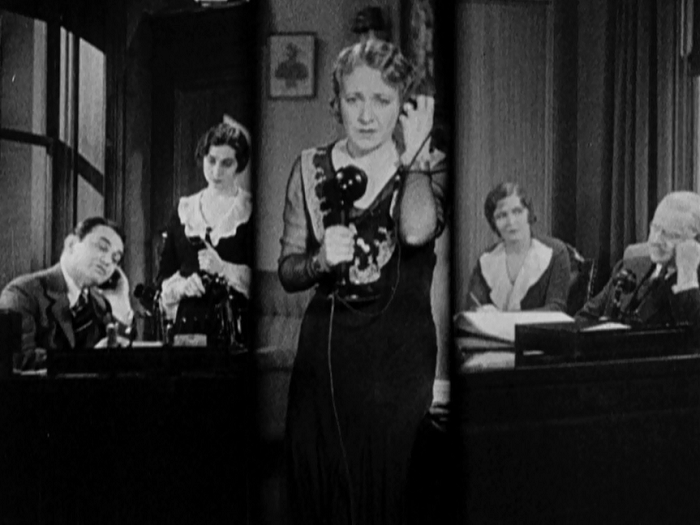
Are you feeling claustrophobic, Nancy?
“I think you can always get people interested in the crucifixion of a woman.”
Newspapers are a band of thugs to Five Star Final, which we see demonstrated as they recklessly toy with lives and destroy newsstands that get in their way. Putting Robinson in this movie not so long after Little Caesar was a bit of subtle nods that the way this film sees media moguls is the same way that most movies see mob bosses.
Director LeRoy does let some scenes get away from him, as the Townsends have so much clunky dialogue that it nearly sends the movie off of a cliff. But every scene with Robinson shines, and the uncanny anger that he exhibits simply crackles. Few actors can make anger look as terrifying as Edward G. Robinson.
The technical details of the film are solid, too. Five Star Final makes no use of a soundtrack, instead papering its beginning with cries of Extra and the ominous whirrs of a printing press. We also spend about ten minutes of the film before Randall arrives, and, while it’s certainly an unsubtle metaphor, opening with him compulsively washing his hands quickly lets us know what we’re in for.
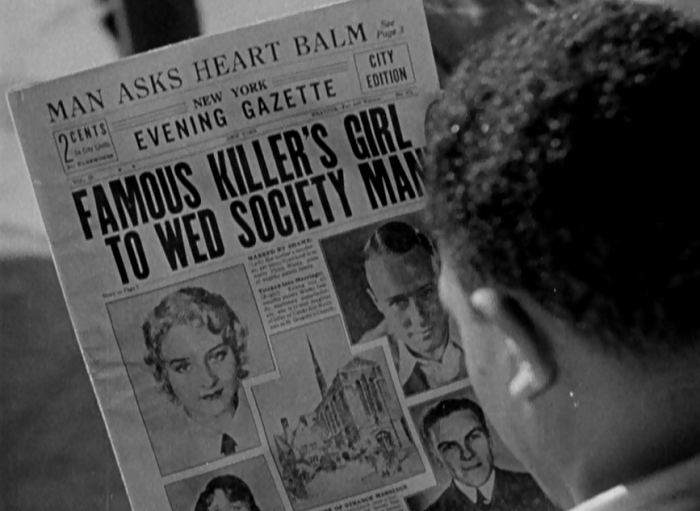
The edition containing all of the dirt to destroy the Townsend family once and for all, whether they like it or not.
Five Star Final is often filmmaking at its least subtle. Every metaphor is underlined, and its climax involves the good natured hero yelling threats against the tabloid newspapers directly to the camera. The last shot, a picture of the Gazette being swept up by a garbageman, almost matches it.
It’s a message movie, through and through, but remains incisive in its condemnations. Randall and his employees still retain their basic humanity, but are trumped by the greed of the publisher. They are the silent soldiers, obeying orders for their salary. In the Depression, this was a little more sympathetic, but the film still doesn’t let their complicity off easily.
While Randall may grow a spine by the end of the film, the greed and power of the Gazette endures. Five Star Final asks who’s watching the watchers, and the question has no answer.
Proof That It’s Pre-Code
- If only to underline the moral emptiness that the newspapermen feel, they spend most of their time in a speakeasy nearby. They also get trashed, and I will admit to feeling quite intimidated just watching how many shots Edward G. Robinson drowns in a fit of self loathing.
- Also of note, the film tosses out a racial slur against Italians without so much as blinking. How times have changed…
- A new reporter is hired to cover the story, and she’s a female reporter! And while she does seem good at her job, she’s mostly hired for her… well…
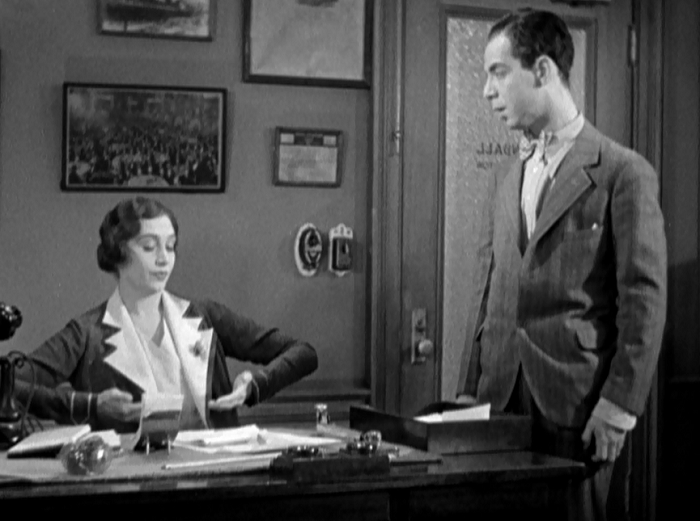
Garbanzos? Can I call them that?
- There are a pair of suicides in the movie, both of which are portrayed as the noble thing to do. We never see the results, but everyone in the film does– the Gazette even takes photos of the dead bodies and splashes them across the front page!
- Some swerving towards profanity here, from the owner almost being called a son of a bitch, to Robinson’s final furious line where he tells his newsmen where they can put their latest scandalous murder headline– “Shove it up your–!”
Gallery
Here are some extra screenshots I took. Click on any picture to enlarge!
Trivia & Links
- Before I went into these, I wanted to thank Karen at Shadows and Satin for recommending that I get this movie. Her site is a wonderful mix of Pre-Code and Film Noir writing, and few other bloggers have as much enthusiasm or style as her.
- There’s a boatload of zippy dialogue in the film, and I wanted to toss out my favorite line:
“It seems to me that editors put themselves on a pedestal over their readers.”
“If I sat on a cigar box, I’d be above our readers.”
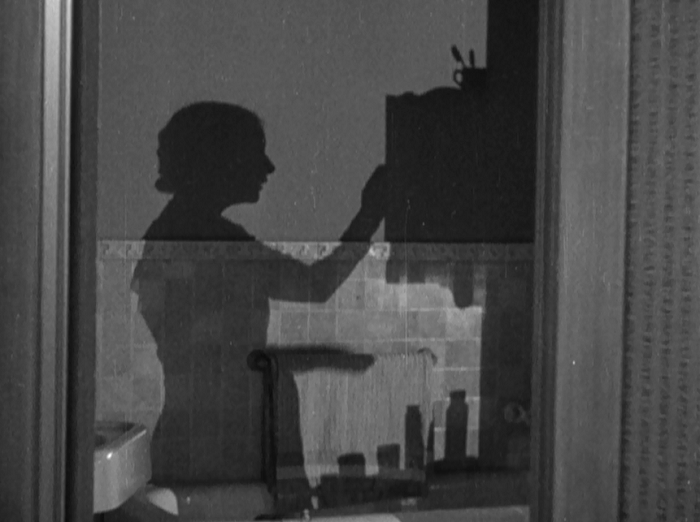
Some other reviews I read insisted that a gun was used in the suicide, but, uh, no. Pretty sure she poisoned herself.
- The Evening Gazette in Five Star Final was based upon the real life New York Evening Graphic, which did many similar stunts in its quest for readers. Movie Diva looks into the film’s origins, first as a book and then as a stage play both written by the former editor of the Graphic. Movie Diva also touches on the many scandals from the early 30’s that the tabloids had preyed upon, and there are some doozies.
- Mordaunt Hall’s contemporary review in the New York Times also adores the split screen telephone scene, calling it, “adroitly filmed.” He also notes all the boos and hisses that Karloff’s Isopod received, saying that the character’s survival through the end of the film, “the film’s only disappointing feature.”
- In case you need even more screenshots, DVDBeaver has got you covered.
- TCM’s website relates an excerpt from Robinson’s biography in which he calls this one of his favorite films, and it’s not hard to see why.
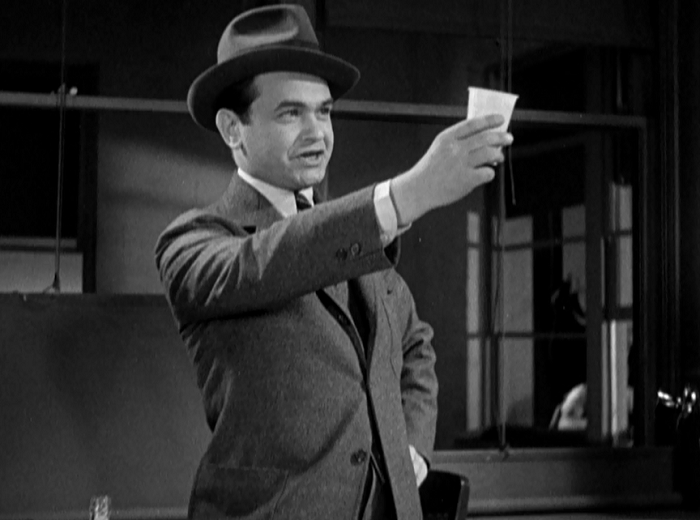
If you made this movie into a drinking game and simply drank every time Robinson did– dead. Before the end credits.
- Everyone’s favorite yellow journalism mogul, William Randolph Hearst, attempted to get this banned since it slanders tabloids and he saw it as a personal attack. It didn’t work, though I’m sure the controversy helped this film’s box office.
- Wonders in the Dark touches on the film’s own hypocrisy– it derides newspapers for frolicking in depravity, while the movie itself contains its fair share of racier moments. I can see where he’s coming from, even if I think the film still retains a moral high ground simply because there are places it won’t go that the paper would; for example, do we ever see the dead bodies in the film?
- Although I can’t make heads or tails of what’s going on with the page’s layout, Greenbriar has some nifty behind the scenes photos, as well as a few from its premiere.
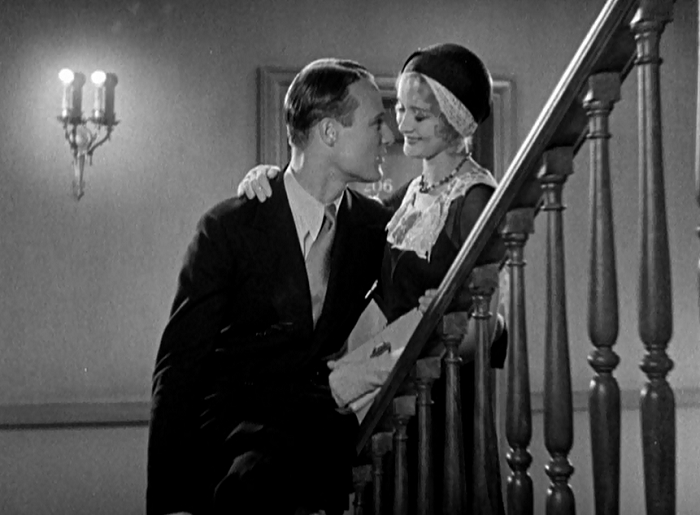
For the record, I could have done with a lot less of this love affair, since it’s so cloying that it’ll give off cavities.
- Filmsnoir.net has helpfully uploaded the last three minutes of the picture onto YouTube. If you don’t mind being spoiled, it’s a great reminder of Edward G. Robinson’s insane charisma.
- The Five Star Final of the movie’s title is referring to the paper’s final evening edition for the day. Nancy’s panicked phone call is a desperate attempt to stop it from printing her story, but it’s already gone to press.
- Even though the picture opens with the First National logo, it was a Warner Brothers picture. The two companies had merged in ’28 and the First National logo was slowly being phased out. For those of you who don’t care about this bit of trivia, well, I don’t blame you.
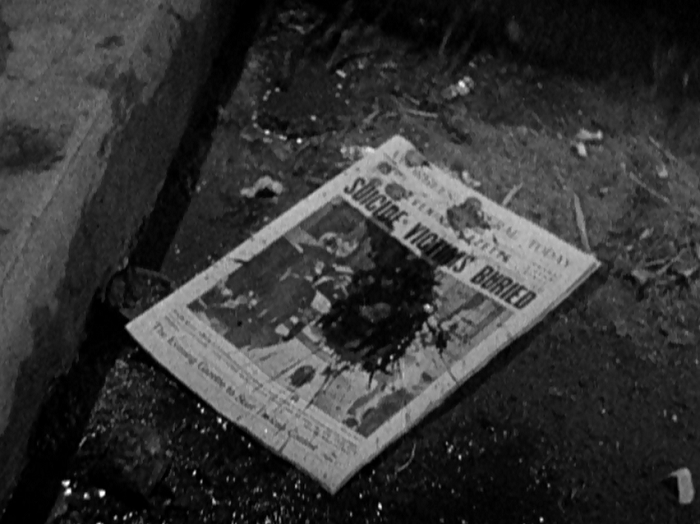
If only I could do that to online newspapers.
- Remade as Two Against the World (1936), which had Humphrey Bogart in the Edward G. Robinson role. It also changed the medium from newspapers to the radio and cut the run time by 30 minutes, though it sounds like the changes weren’t for the better.
- I’d say the film’s poster halfway looks good. It’s a good idea, but the problem is that instead of making Robinson look like a prisoner in the paper, it more looks like he’s in the middle of a 1980’s power ballad. That’s not really the posters fault for looking so wispy, but there you go.
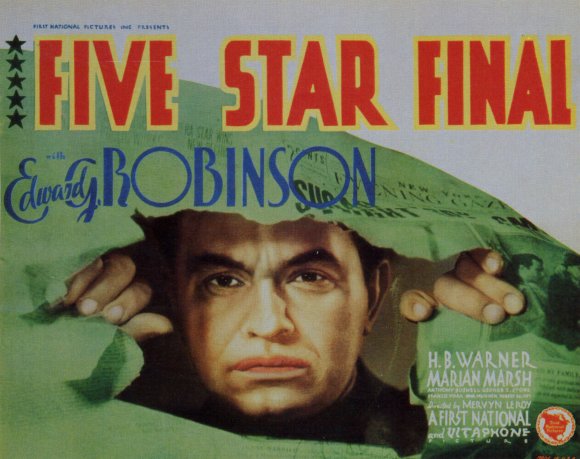
“Listen to your heart… when he’s calling for you. Listen to your heart…
there’s nothing else you can do!”
Awards and Accolades
Availability
- This film is available on Amazon and Warner Archive, and can be rented from Classicflix.
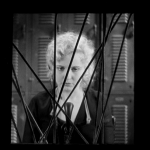
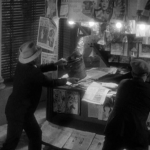
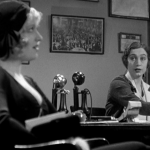
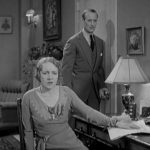
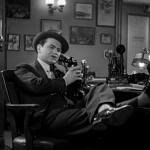
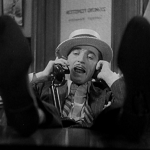
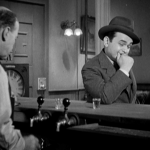
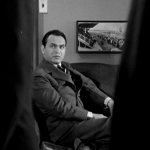




8 Comments
shadowsandsatin · March 2, 2013 at 7:44 pm
First-rate write-up, Danny, as always. Loved your insights and the trivia, and thank you so much for your kind words about my site. I’m so glad you liked the movie!
Danny · March 2, 2013 at 10:40 pm
Much appreciated Karen, for the both the movie and comment. Keep up the good work!
brianpaige · June 23, 2013 at 4:22 pm
This film is a near classic due to the newspaper scenes and the powerful drama. But it’s almost a tale of two movies. It almost seems like some new wave of hard edged Warners contract players are clashing with this old guard of silent movie actors trying to melodramatically adjust to sound. The first time I saw it I thought it was a great movie. The 2nd time…well, Robinson, McMahon, Karloff, and Co. are still terrific but the romantic leads and the family members just suck. Bad early talkie acting running wild.
That said, Robinson’s total meltdown at the end is just epic. I remember my dad’s reaction during that climactic scene: “Robinson has finally decided to do some acting here!”
Ellen Kearns Asleson · September 29, 2014 at 10:26 pm
Danny: After reading about this movie for years, I finally caught it on TCM last week. What a great, great movie. And a reminder (as if I needed one) of what an amazing actor Robinson was. He could generate chemistry with a potted plant. And Karloff? As you said; terrifying, even without makeup. Great review!
Danny · October 8, 2014 at 6:54 pm
Thanks, glad you liked the movie! That finale really is something else.
justjack · October 12, 2014 at 1:55 am
Yes, the finale is great. For just a split second there, when Robinson takes the phone call, his reaction to the reporting of another lurid story made me think, wow, he’s right back in the gutter! How cynical is that? And then he reveals how he really feels and finishes with the “shove it up their–” and the telephone through the glass. Boy, that was satisfying.
The Townsend family is a little too goody-goody in their goody-goodness, but I guess they have to be in order for the Gazette’s exploitation to be as thoroughly hateful as the movie wants it to be. Danny, you’re right when you call this movie unsubtle. But that doesn’t stop it from being a fun watch. One thing I liked about the Townsends was how the young couple’s trajectory mirrored the older couple’s past, as the jejune, banal young man finds the strength to break from his family and marry Jenny; his final appearance showed him to be growing into somebody with unexpected spine. I imagine H.B. Warner was supposed to be like him when he married Nancy all those years ago.
It’s awesome seeing Karloff here. And all of the second line actors are just great: Ona Munson, George E. Stone, and Aline MacMahon (in what I think Robert Osborn said was her first movie appearance).
Finally, about the suicides; I had to rewind to check what Nancy took out of the medicine cabinet, because her moan and immediate fall to the floor made me wonder if maybe she’d used a razor to slit her wrist or something. World’s fastest acting poison, I guess.
Danny · October 29, 2014 at 2:14 pm
Yeah, this is a solid little film. And you make a great point about the parallels between the older and younger couple, with Marsh saying the peace her mother never got to.
And I would guess Nancy took some sort of rat poison. Though I don’t know what you’d keep that in the medicine cabinet…
thelovenest95 · March 1, 2015 at 9:22 am
Good movie, and good review. As corny as some of the movie was, I actually “fell” for it and was somewhat gratified that the erstwhile son-in-law didn’t cave to his money-grubbing parents in the end. Just goes to show that even a corny ’30s movie can get under your skin.
Comments are closed.